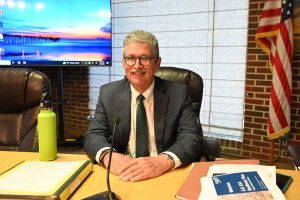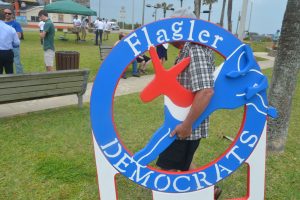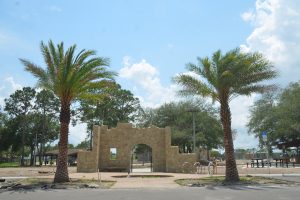
Weather:Sunny. Highs in the upper 80s. West winds 10 to 15 mph with gusts up to 25 mph. Tuesday Night: Mostly clear in the evening, then partly cloudy with a slight chance of showers after midnight. Lows in the upper 50s. West winds 10 to 15 mph with gusts up to 25 mph, becoming northwest 5 to 10 mph after midnight. Chance of rain 20 percent.
- Daily weather briefing from the National Weather Service in Jacksonville here.
- Drought conditions here. (What is the Keetch-Byram drought index?).
- Check today’s tides in Daytona Beach (a few minutes off from Flagler Beach) here.
- Tropical cyclone activity here, and even more details here.
Today at a Glance:
The Palm Coast City Council meets at 9 a.m. at City Hall. The council is expected to make its decision on the District 3 seat appointment. For agendas, minutes, and audio access to the meetings, go here. For meeting agendas, audio and video, go here.
Food Truck Tuesdays is presented by the City of Palm Coast on the third Tuesday of every month from March to October. Held at Central Park in Town Center, visitors can enjoy gourmet food served out of trucks from 5 to 8 p.m.–mobile kitchens, canteens and catering trucks that offer up appetizers, main dishes, side dishes and desserts. Foods to be featured change monthly but have included lobster rolls, Portuguese cuisine, fish and chips, regional American, Latin food, ice cream, barbecue and much more. Many menus are kid-friendly. Proceeds from each Food Truck Tuesday event benefits a local charity.
Random Acts of Insanity Standup Comedy, 8 p.m. at Cinematique Theater, 242 South Beach Street, Daytona Beach. General admission is $8.50. Every Tuesday and on the first Saturday of every month the Random Acts of Insanity Comedy Improv Troupe specializes in performing fast-paced improvised comedy.
Notably: But for his strange and embarrassing reactionary turn in his old age, Mario Vargas Llosa, who died on Sunday at 89, was one of the great writers of our age, a near-realist who turned Peru into the world’s literary backyard with his early masterpieces like The Green House, named for a whorehouse of his youth (the story is as much about the whorehouse as about the surrounding jungle), Conversation in the Cathedral, with that wonderful opening line: “From the doorway of La Crónica Santiago looks at the Avenida Tacna without love: cars, uneven and faded buildings, the gaudy skeletons of posters floating in the mist, the gray midday. At what precise moment had Peru fucked itself up?” or the uproarious Aunt Julia and the Scriptwriter and the Mrs. Robinson-like infatuation of an 18-year-old student with his 32-year-old aunt, in parallel with the story of the furiously-writing Pedro Camacho, writer of radio soap scripts: “Three things about Pedro Camacho fascinated me: what he said; the austerity of his life, entirely devoted to an obsession; and his capacity for work. This latter especially. I had read about Napoleon’s tremendous endurance in Emil Ludwig’s biography of him, how his secretaries would collapse in utter exhaustion and he would go on dictating, and I often pictured the Emperor of the French as having the same face with the prominent nose as the scriptwriter, and for some time Javier and I called Pedro Camacho the Napoleon of the Altiplano (or, alternatively, the Balzac of Peru).” I read these books furiously in the 1980s, hypnotized by his inventive use of form to fit his themes and the immediacy of his language, even in translation, the exuberance of his realism, the feeling that, as I read, Peru was in my veins as was the joy of somehow managing to live through sorrows. I couldn’t wait until the next Vargas Llosa book came out, though I didn’t realize until I stacked his books on the desk to write this that I had so many, that he had at one point influenced me so much, and how much I’d turned my back on him after he went for politics. He was in the runoff for president of Peru, and after that he was never the same. Politics corrupts as much as power. His Nobel was natural. Here are a few words from In Praise of the Stepmother: “ “The repetitive, churchly strains of the organ create an auspicious atmosphere. It is generally thought that the organ, so closely associated with the Mass and the religious hymn, desensualizes and even disincarnates the humble mortal bathed in its waves. A gross error; in truth, organ music, with its obsessive languor and its soft purr, merely disconnects the Christian from the world and from contingency, isolating his mind so that it may turn toward something exclusive and different: God and salvation, quite true, in countless cases; but also, in many others, sin, perdition, lust, and other harsh municipal synonyms for what is expressed by that limpid word: pleasure.” Now he can finally enjoy his perpetual orgy.
—P.T.
View this profile on Instagram
![]()
The Live Calendar is a compendium of local and regional political, civic and cultural events. You can input your own calendar events directly onto the site as you wish them to appear (pending approval of course). To include your event in the Live Calendar, please fill out this form.
January 2026
Free For All Fridays With Host David Ayres on WNZF
Flagler County Cultural Council (FC3) Meeting
Friday Blue Forum
‘Lady Day at Emerson’s Bar and Grill,’ the Billie Holiday Story, at City Rep Theatre
Flagler Beach Farmers Market
Coffee With Flagler Beach Commission Chair Scott Spradley
Democratic Women’s Club
Grace Community Food Pantry on Education Way
The Rainbow Bridge Dedication at Holland Park
‘Lady Day at Emerson’s Bar and Grill,’ the Billie Holiday Story, at City Rep Theatre
Random Acts of Insanity’s Roundup of Standups from Around Central Florida
For the full calendar, go here.

I have never felt like a stranger in Manhattan, and, like millions who have spent time here, I felt that September’s apocalypse had hurt me personally, destroying and annihilating something that in some way difficult to explain also belonged to me. Always after a few days here, I had the sense of being here much longer, doing more things, feeling more enthusiasm and fatigue than those few days would have given me in any other city. In New York I have always felt I was at the center of the world, in a modern Babylon, a sort of Borgesian aleph with representation of all the languages, religions and cultures of the planet, and from which, as from a giant heart to the extremities, there circulate to the globe all fashions and vices, values and nonvalues, usages, customs, music, images and prototypes resulting from the incredible mixtures in this city. The feeling of being a grain of sand in a fairy-tale cosmopolis may be somewhat depressing, but at the same time exciting, in the sense of what Julio Cortázar wrote about Paris: “It is infinitely preferable to be unknown in a city that is everything than to be famous in a city that is nothing.” New York is of no man and every man: of the Afghan taxi driver who barely speaks English, the turbaned Sikh, the wok-wielding cook in Chinatown and the singer of Neapolitan songs in the restaurants of Little Italy. It is of the Dominicans and Puerto Ricans who fill streets with plena, salsa and merengue; and the Russians, Ukrainians, Kosovars, Andalusians, Greeks, Nigerians, Irish, Pakistanis, Ethiopians who, as soon as they arrive, are turned into New Yorkers by the absorbent magic of the city. But there are those who hate this absorbency.
–From Mario Vargas Llosa’s “Out of Many, New York,” New York Times, Dec. 11, 2001.







































Leave a Reply